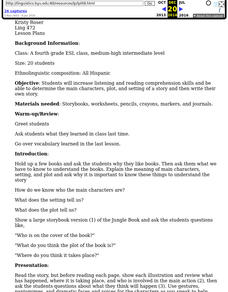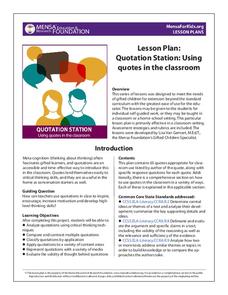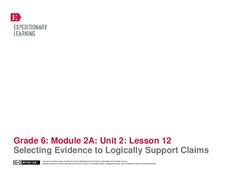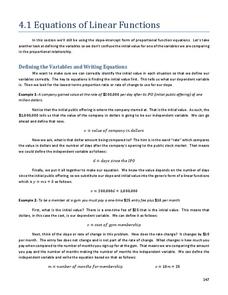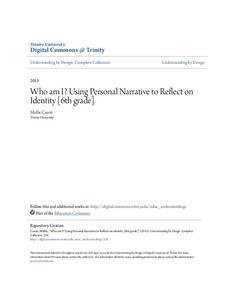Curated OER
Language Practice
The simple instructional techniques described in this plan will help young readers learn and practice basic reading skills and strategies. Before reading, introduce your readers to the meaning of main character, setting, and plot. Then...
Macmillan Education
Critical Thinking
Encourage learners to think deeply about the information they read or hear. Through a series of life skills worksheets, your pupils will consider the need for objectivity, identifying missing information, and problem solving.
Novelinks
Tuck Everlasting: Similes, Metaphors, and Personification in Imagery
Poetic language is abundant in Natalie Babbitt's beautiful novel, Tuck Everlasting. Learners note the examples of similes, metaphors, and personification they find as they read, and illustrate how the language creates a sensory...
Curated OER
Build Masters: Identifying Details
Find key details in books using this note card strategy. Each reader gets six cards with the classic who, what, where, when, why, and how detail prompts. After they read the book, they choose a card and locate a key detail answering the...
California Education Partners
My Librarian is a Camel
A two-part assessment challenges scholars to gather information from reading then write an opinion piece. In part one, learners read, take notes, and answer text-related questions. In part two, participants use their new-found knowledge...
California Education Partners
Seeing Eye to Eye
A performance task challenges scholars to read an informational text then respond with an explanatory essay. The exam begins with an independent reading of Seeing Eye to Eye by Leslie Hall. A second reading follows with the completion of...
California Education Partners
Vincent Van Gogh
Living in someone's shadow would be difficult for anyone, including one of the most talented artists of the modern age. Middle schoolers read an excerpt from Vincent Van Gogh: Portrait of an Artist by Jan Greenberg and Sandra Jordan...
K12 Reader
Inference Practice: Who Am I?
Have a little fun teaching your class about inferences with this short and simple guess who exercise. Provided with five short passages describing different types of people, young learners must read each one and use the included details...
EngageNY
Writing: Drafting Body Paragraphs and Revising for Language
Begin the drafting phase of the writing process with a lesson plan focused on logically writing three body paragraphs. Then, revise the writing to make it more formal after a teacher-directed mini-lesson plan. Each paragraph highlights...
EngageNY
Word Problems Leading to Rational Equations
Show learners how to apply rational equations to the real world. Learners solve problems such as those involving averages and dilution. They write equations to model the situation and then solve them to answer the question — great...
Houghton Mifflin Harcourt
Nature: Friend and Foe: English Language Development Lessons (Theme 6)
If readers don't understand key portions of a text, it may seem more like a foe than a friend. The second resource in a series of three ESL lessons designed to accompany the texts in Nature: Friend or Foe makes the texts easier to...
MENSA Education & Research Foundation
Quotation Station: Using Quotes in the Classroom
An informative list compiled with quotes, authors, and discussion questions, along with 20 out-of-the-box application ideas, make up the collection of lessons geared to spark dialogue and creative thinking about quotations.
Novelinks
The House on Mango Street: Letters/Unsent Letters
Class members conclude their reading of The House on Mango Street with an assignment that asks them to compose letters to characters using their own voices or that of another character in Cisneros' story.
Roald Dahl
Matilda - The Platinum-Blond Man
Before reading Chapter Six, "The Platinum-Blond Man" in Matilda, readers preview the illustration of Mrs. Wormwood dropping her plate of food, and think about what may have happened to cause the scene. After reading the chapter, class...
College Board
AP® English Language Special Focus: Using Sources
What is the most effective way to teach scholars how to write a research paper? Educators explore the topic with the AP® English Language and Composition exam resource. The reference material guides teachers in best practices for using...
Missouri Department of Elementary
Goldilocks Revisited
After a read-aloud of the story Goldielocks and the Three Bears, scholars gather into small groups to answer a series of questions. Peers examine the idea of smart decisions and identify three feelings of characters alongside three...
EngageNY
Planning for Writing: Introduction and Conclusion of a Literary Argument Essay
After completing three body paragraphs of an argument essay about life's rules to live by from Bud, Not Buddy Christopher Paul Curtis, it's time to begin writing the introduction and conclusion. Independently, pupils draft the final two...
EngageNY
End of Unit 2 Assessment: Final Draft of Literary Argument Essay
Take the last step in writing a literary argument essay using Bud, Not Buddy by Christopher Paul Curtis in an activity focused on feedback. Using the stars and steps revision method, pupils consider teacher and peer feedback to revise...
EngageNY
Selecting Evidence to Logically Support Claims
It's time to make a rule sandwich! After exploring the writing assignment's rubric and analyzing a model essay, learners are guided through the prewriting phase using the sandwich technique. Pupils create their sandwich addressing the...
Charleston School District
Equations of Linear Functions
Teaching linear function relationships using contextual information is beneficial to pupils' understanding. The lesson uses problem solving to build linear functions given different information for each problem. This is the second in a...
Trinity University
Who Am I? Using Personal Narrative to Reflect on Identity
Who am I? Pupils work to answer this question through a unit that explores personal narratives and identity. Exit tickets for activities that examine different poems, short stories, and autobiographical writing serve as prewriting for...
Curated OER
Reading Comprehension: Jamaica Louise James
In this reading comprehension worksheet, students cut out 5 bookmarks. Each bookmark focuses on a story element in the book Jamaica Louise James by Amy Hest. Students answer the questions on the bookmarks. Included are: making...
Curated OER
Read Aloud- Literary Elements- Prediction
First graders read two stories. In this literary elements instructional activity, 1st graders read The Hat by Jan Brett, notice patterns of prediction, identify the setting, problem and solution and compare the story to the book The...
Curated OER
Business Strategy with Asia: Outsourcing or Not?
Learners examine the advantages and disadvantages of outsourcing personnel resources to Asia. They investigate through internet research as well as community business leaders why businesses outsource to other countries. In the end,...


